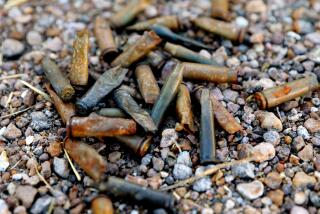TV Reviews : On TBS, Brutal Facts About Poisons That Yield Profits
- Share via
Ted Turner’s vaunted claims for putting television’s power and resources to work for the environmental movement appear to be more than lip service. If tonight’s segment of “The Better World Society”--titled “Profits From Poisons” (TBS, 10:20 p.m.)--is any indication, a new and expanded audience is about to learn some cold, uncompromised facts about the global environmental crisis.
The facts in “Profits From Poison” are not new; such books as “Circle of Poison” and the Worldwatch Institute’s annual “State of the World” reports long ago documented the pattern of toxic pesticide poisoning in the Third World. Transferring such information from the restricted page to the expansive mass media, as producer-director Jamie Hartzell has done, is a major achievement. And an overdue one, some might add.
What is striking here is how Hartzell and company do not shrink from showing an utterly devastating situation, how nontoxic and farmer-developed alternatives to pesticides are being instituted, and how the Better World Society gives viewers practical means to get involved with the issue.
The cameras focus on the Philippines and Thailand, but they could point toward virtually any Third World country and the story would be the same. With the advent of the Green Revolution in the ‘60s, which had new, high-yield crop hybrids replace old, low-yield ones in poor countries, new fertilizers and pesticides also came in their wake. The results have been a social and ecological disaster. Pesticide use has increased tenfold, yet the pest population has doubled. According to the United Nation’s World Health Organization, 20,000 people die and 1 million get sick every year from pesticides.
The film unflinchingly connects the marketing of and profits made from these chemicals (most of which are banned in the West, yet exported by the American and European manufacturers) with the lack of farm-worker unionization, economic freedom and a stark kind of feudalism. It also shows how ecologically sound methods, such as integrated pest management and organic farming, are making a dramatic comeback. It is called a “comeback” because Thai and Filipino farmers tended to their fields organically for centuries--before chemical companies discovered a huge, unrestricted market.
The photography and editing in “Profits From Poison” occasionally reach the level of poetry. The post-film discussion, with Oklahoma Congressman Michael Synar, the Natural Resources Defense Council’s Janet Hathaway and the National Audubon Society’s Maureen Hinkle, is less eloquent and a mundane anticlimax after the beautiful, harsh documentary.
More to Read
The complete guide to home viewing
Get Screen Gab for everything about the TV shows and streaming movies everyone’s talking about.
You may occasionally receive promotional content from the Los Angeles Times.






